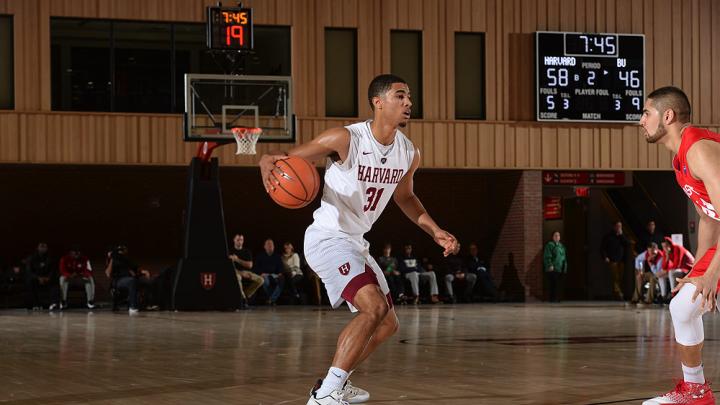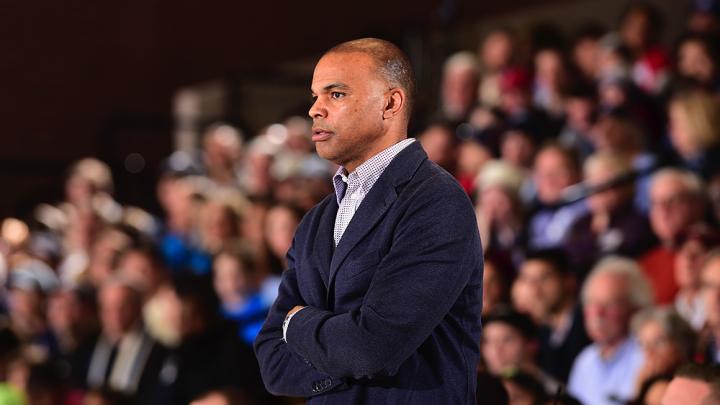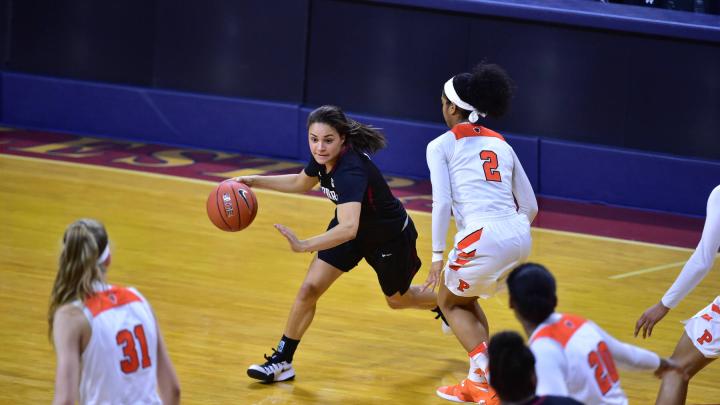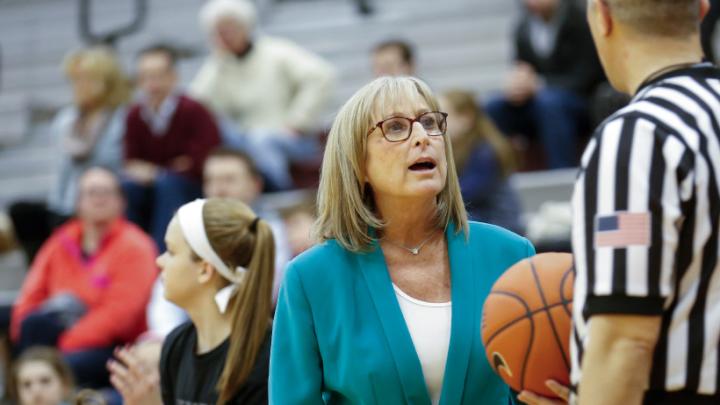On Sunday afternoon, Penn’s senior guard Darnell Foreman sat on the dais at the Palestra during the post-game press conference. Moments after closing out a 68-65 victory over Harvard in the Ivy League tournament championship game and with the tournament championship trophy to his right, he was wearing a wide grin.
It easily could have been Harvard up there, if a couple of things had played out differently. With just over 12 seconds left and Penn ahead by three, Christian Juzang ’20 brought the ball up the floor and handed it off to Justin Bassey ’20, who hoisted a three-point attempt. As Stemberg coach Tommy Amaker said later, Bassey was aggressive and confident but may have slightly rushed the shot, which caromed off the backboard. The rebound fell to freshman Rio Haskett, who swung the ball out to Juzang for another three-point attempt, this time in the corner. But that shot was off, too, and the buzzer sounded, setting off another kind of scramble: the Penn students stormed the floor, and streamers rained down from above. As the Quakers celebrated their first trip to the NCAA tournament in 11 years, Harvard returned to the locker room.
That loss ended a disappointing weekend for the Harvard basketball teams. The top-seeded men had advanced to the tournament final after defeating Cornell 74-55 on Saturday, before falling to the Quakers. The Harvard women also lost to Penn, 57-52, in a semifinal on Saturday night. Both teams will miss the NCAA tournament.
A Championship Setback
Late in the first half of Saturday’s game against Cornell, it looked as though the men’s team might fall in the semifinal round for the second consecutive year. The Harvard players seemed dazed as they tried to adapt to an array of Big Red defenses and played a little too aggressively themselves on defense. Again and again, the team committed fouls after being beaten on backdoor cuts. Then the momentum shifted: the Crimson closed the half on a 16-4 run, capped by a 40-foot three-pointer by Juzang at the buzzer that put Harvard up 37-32. In the second half, the team didn’t look back. Led by Ivy League Player of the Year Seth Towns ’20, who had a game-high 24 points, it outscored the Big Red 37-23 en route to a 19-point victory.
As the championship game got underway on Sunday, the Harvard players picked up right where they had left off. Benefiting from a balanced offensive attack, the Crimson led 30-17 with just over five minutes left in the first half. Foreman had almost singlehandedly kept his Quakers teammates in the game, scoring 11 of Penn’s first 13 points (the senior finished the first half with 19 points).
Then the Quakers went on a 28-2 run that spanned the end of the first half and the start of the second. That stretch featured more heroics from Foreman, who hit a three at the halftime buzzer to give Penn a 34-32 lead. The rest of Penn’s offense started clicking as well, including Ryan Betley (17 points) and AJ Brodeur (16 points), both of whom scored buckets just before Foreman’s buzzer-beater. The surge also woke up the Palestra crowd, which rose to its feet and started making noise, while the Crimson struggled to find the basket. Making matters worse, Towns left the game with a knee injury late in the second half, meaning that any Harvard comeback would have to happen without the team’s best player.
Down by 10 (55-45), the Crimson nearly did just that, going on an 13-0 run to take a 58-55 lead with just over five minutes remaining. At that point, the team’s inside-out offense was rolling. Center Chris Lewis ’20 tallied several buckets down low and Bassey drained a three-pointer. Lewis said later that the Crimson had been “motivated,” not demoralized, by the loss of their best player. “We knew that now we need[ed] to win the game for him.”
Unfortunately, the Quakers made a couple more plays down the stretch, including a pair of threes by Penn senior Caleb Wood to pull the Quakers out of a 60-57 deficit and give them a lead they would hang onto until the final buzzer.
After the game, Amaker put the loss in perspective. As the coach recalled in the post-game press conference, he told his players that he understood what they were feeling, that he’d “sat in those seats that they’re sitting in when you come up short in those big moments.” The Crimson’s young core (the team starts four sophomores) also hopes to have an opportunity to return to this stage next year and beyond. But first, there will be more basketball this season. By winning a share of the Ivy League regular season championship and earning the number-one seed in the conference tournament, the Crimson (18-13 overall) received an automatic berth to the National Invitational Tournament (NIT). The Crimson, a seven seed, will play at Marquette University, a two seed, in the opening round of the tournament on Wednesday.
A Semi-Final Stumble
The Crimson women also had an opportunity to tie the game on a three-pointer, as the clock wound down in their Saturday night semifinal against Penn. With 37 seconds left, Harvard inbounded out of a timeout and got the ball to Katie Benzan ’20. She had been on fire all evening: drilling a three at the start of the first quarter to open the scoring, making another three at the start of the second quarter to break an 8-8 time, and draining three threes early in the third quarter to help Harvard overcome a 23-18 halftime deficit and take a two-point lead. This time, Benzan—who had been face-guarded by the Quakers for much of the second half—missed. Her teammates grabbed an offensive rebound, but Benzan missed her next three as well, forcing the team to foul the Quakers, who hit three of four free throws down the stretch to earn a 57-52 victory.
Early on, it had looked like things might go the other way. The Crimson jumped out to an 8-2 lead on the strength of Benzan’s three and a pair of buckets by Sydney Skinner ’19 and Taylor Rooks ’18. Then late in the first quarter, the Quakers started mixing up their defense—using a blend of zone, pressing, and trapping—that caused Harvard to turn the ball over and helped trigger a 6-0 Quakers run that tied the game. That trend continued in the second quarter, when Harvard coughed up the ball five times, helping the Quakers ease out to a five-point halftime edge.
Benzan erupted for three threes at the start of the third quarter, showing why she was a first-team All-Ivy selection as well as the conference leader in three-point shooting percentage. “I was just hungry,” said Benzan, “and I had a mindset that we weren’t going to lose that game, so coming out of the third quarter, I put my team on my shoulders and did what I had to do.” That prompted the Quakers to have a player glued to Benzan and attempt to deny her the ball. That forced the Crimson to run its point guard off numerous screens, which may have tired her out and contributed to Benzan not quite having the legs to make those final three-point attempts.
The women’s team, like the men’s, will return much of the nucleus of this year’s squad, including Benzan; center Jeannie Boehm ’20; and a trio of talented junior guards in Skinner, Madeline Raster, and Nani Redford. This bodes well for their future hopes of winning a conference championship and tournament, but, first, they will wait to find out if they receive an at-large berth in this year’s Women’s NIT (WNIT), or another post-season tournament. The WNIT bracket will be unveiled on Monday evening.











